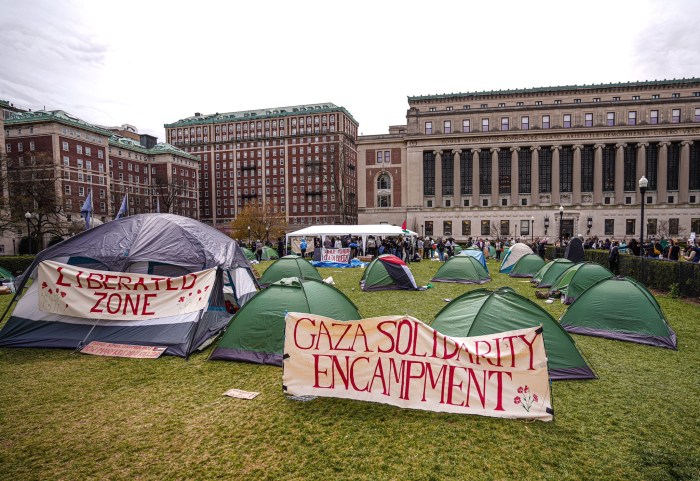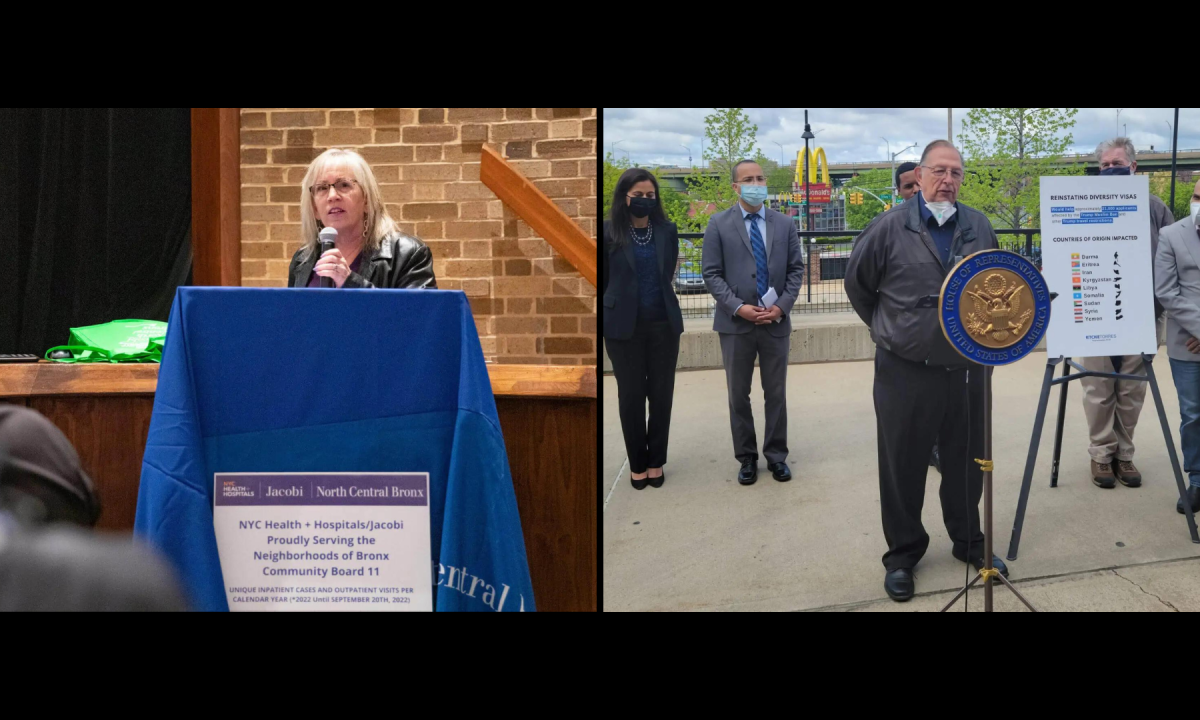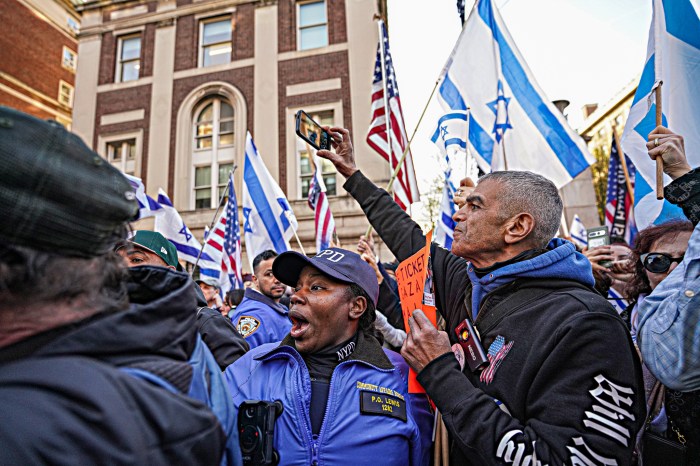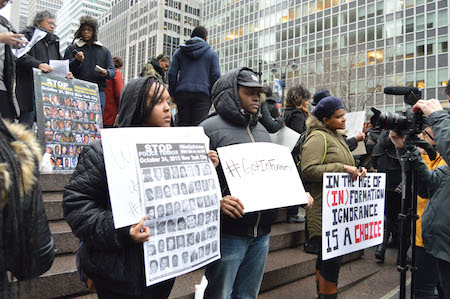
BY JACKSON CHEN | Outside the National Football League’s Midtown offices, a controversial protest of Beyoncé’s Super Bowl halftime show planned for first thing in the morning on February 16 was easily outflanked by a counter-protest supporting the pop and R&B superstar.
By 8 a.m., at least 30 counter-protesters led by the civil rights collective Black Girl Rising! had assembled on the corner of Park Avenue and East 52nd Street, carrying signs referring to Beyoncé’s new single, “Formation.” Meanwhile, the opposition to the iconic star was, at best, sparse; in fact, their presence was only noticed a couple of hours later.
The controversy began when Beyoncé debuted her new song, “Formation,” the night before a Super Bowl performance that raked in as many as 115.5 million viewers, according to Nielsen’s estimates. During Beyoncé’s performance, she and her backup dancers — donning garb that many likened to the attire of the radical Black Panther Party — danced in an X formation, alluding to the slain African-American activist Malcolm X.
While many Beyoncé fans, who refer to her as Queen Bey, Mrs. Carter, or simply Yoncé, celebrated the beloved star finally taking a stance on social injustice, the opposition proclaimed that her song had anti-police sentiments, arguing it was inappropriate fare for the Super Bowl.
Shortly following the release of her “Formation” music video, critics called for a protest to demand that the NFL apologize for the performance and promise to never again air musical performances with political overtones.
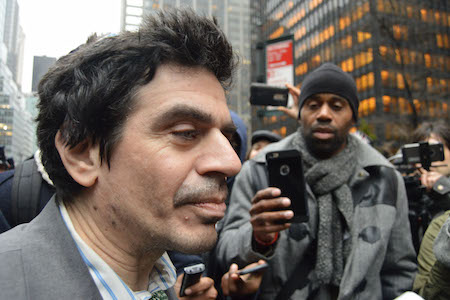
Among the few that showed up during the rainy protest, the soft-spoken Ariel Kohane said he had been in the background since 8 a.m. protesting outside the NFL offices.
“I would like them to issue a public apology and never have a situation again where you have anti-police lyrics, songs, or statements,” Kohane said of the league and the Super Bowl. “This is not a venue for stirring up either a political debate or whatever feelings you have.”
Once his presence became known, dozens of counter-protestors, including Black Lives Matter activists, swarmed Kohane, who was sporting a Ted Cruz campaign button. While Beyoncé fans grilled Kohane about what he termed questionable lyrics in “Formation,” he said he didn’t know the organizer of the protest and simply turned out in solidarity with the Blue Lives Matter movement that supports police.
One considerably higher profile critic of Beyoncé’s halftime performance was former Mayor Rudy Giuliani, though he made his comments not in the rain this week, but on February 8 in a Fox News’ “Fox & Friends” segment.
“This is football, not Hollywood,” said Giuliani. “And I thought it was really outrageous that she used it as a platform to attack police officers who are the people who protect her and protect us, and keep us alive.”
Despite Kohane and April Bedunah — another pro-police protestor against the halftime show — holding tough to their opinions and engaging their opponents in spirited arguments on Park Avenue, the counter-protestors declared that “peace and love won today.”
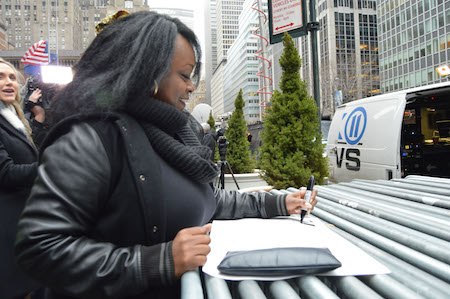
Mela Machinko, one of the three Black Girl Rising! organizers of the counter-protest, said their numbers and voices trumped the original protestors and their disapproval of Beyoncé and her performance.
“I think it’s great you have more of a showing of people who want to push back against their divisive message than the divisive people themselves,” Machinko said of the opposition. “It’s easy to be hateful and be a troll from behind your computer screen when nobody’s watching.”
Like the rest of the pro-Beyoncé crowd present, Machinko was dressed in all-black clothing with a matching beret.
“We were really excited about Beyoncé, and it felt really joyful, affirming, very black, and we felt solidarity in that,” Machinko said. “Then there popped up this group of people who thought that Beyoncé being black out loud was somehow offensive.”
Alongside Machinko, Jacky Johnson and Mary Pryor also rallied the troops to voice their opinions in favor of influential stars using their platforms to speak about tough topics.
“We came out because we wanted to not let this group send a message to the NFL that as a country we don’t want people to speak out on social justice issues,” Johnson said.
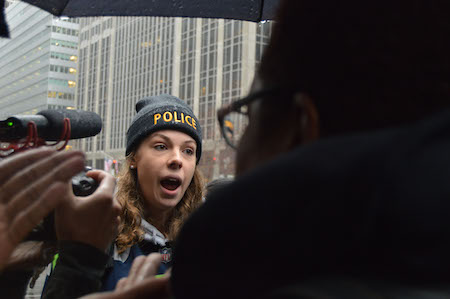
According to Johnson, the low numbers of the Beyoncé protestors spoke to the weakness of their arguments and raised questions about the actual identity of the protest’s organizers.
“In the age of social media, sometimes people can seem a lot bigger than they are and really could just be one person behind a computer,” Johnson said.
As the crowd simmered down around noon — despite the original protest having been scheduled to run until 4 p.m. — Queen Bey’s fans considered their counter-protest a victory in expanding the dialogue about racial issues across the nation.
“Regardless of how many people showed up, it’s these moments that create the change,” said Johnson. “And we’re going to keep speaking out.”










